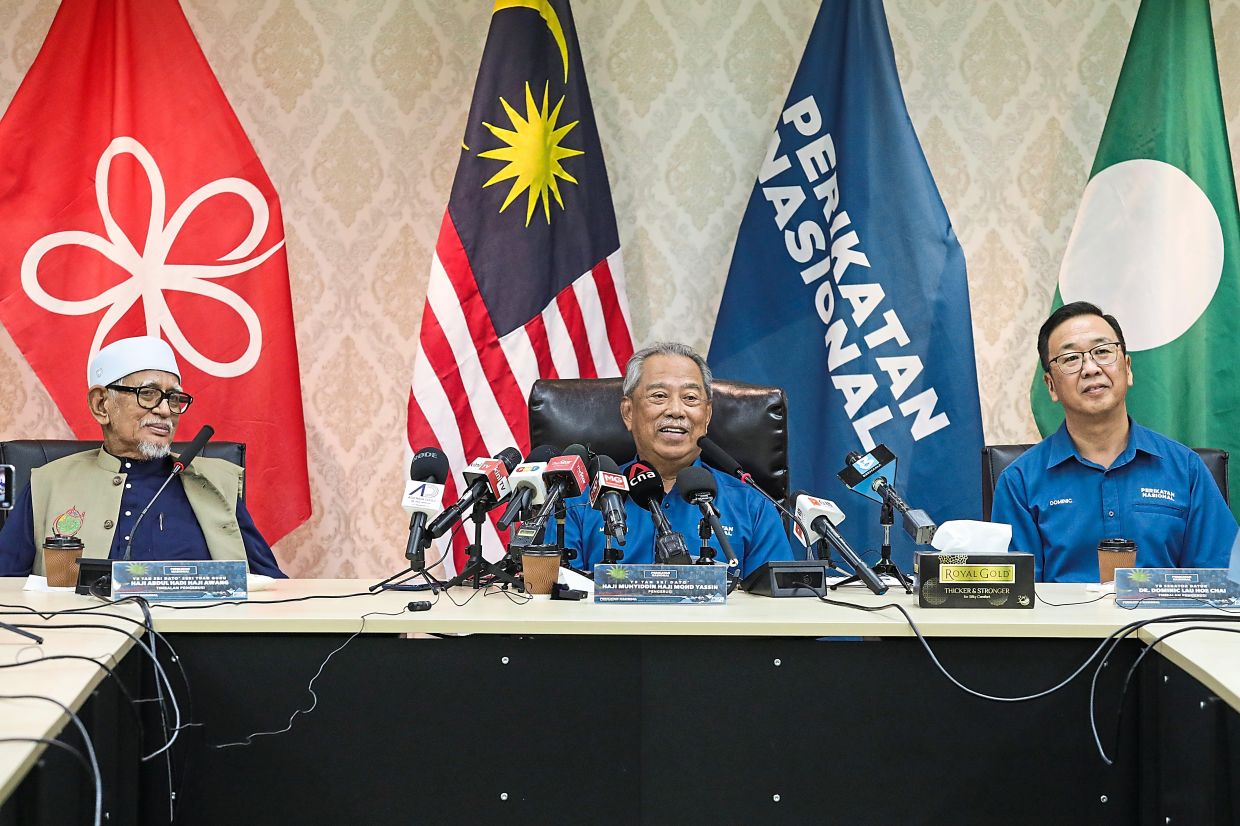
Equal partners?: (From left) PAS president Tan Sri Abdul Hadi Awang, Bersatu president Tan Sri Muhyiddin Yassin and Lau holding a press conference after the coalition’s meeting on seat allocation for the upcoming state elections at Perikatan‘s headquarters. Gerakan can only bargain if it has sufficient clout to balance out PAS, says the writer. — YAP CHEE HONG/The Star
IT’S going to be a tough state election for Gerakan, the only multiracial partner in the mainly Malay-Muslim platform Perikatan Nasional, since the two main partners, Bersatu and PAS, are mono-ethnic.
Gerakan looks like an odd bedfellow. Its philosophy and principles contrast with what Bersatu and PAS preach.
When its party president Datuk Dr Dominic Lau sits among PAS leaders decked in their robes and skull caps, he must surely feel out of place.
He will be testing his luck in the Bukit Tengah state seat of Penang in the coming state polls.
It’s a racially mixed seat with a composition of 47.33% Chinese, 35.5% Malays, 16.7% Indians, 0.8% East Malaysians and 0.18% constituting others.
In the 2018 state polls, Pakatan Harapan’s Gooi Hsiao Loong from PKR won the seat with a 8,558 majority in a five-way contest. PAS managed only 2,355 votes.
In 2013, PKR’s Ong Chin Wen beat Barisan Nasional’s Teng Chang Yeow of Gerakan with a 5,190-vote majority.
Lau will be vying to get all the votes from PAS, the discontented Malay votes and the disgruntled Umno ballots, who can’t accept working with DAP. If he succeeds, then he may just pull through.
The strong showing of Perikatan, especially PAS, in the predominantly Malay electorate on the mainland in 2022, must have emboldened him, with all the expectations of a green wave continuing its course at the state polls.
After all, if a big name like Nurul Izzah Anwar can be defeated by an unknown PAS ulamak, Muhammad Fawwaz Mat Jan, with a majority of 5,272 votes, Lau must be hedging his bets on having a fighting chance with the Malay votes.
As political analyst Mustafa Anuar rightly wrote, “Lau’s confidence also seems to derive from the personal conviction of Perikatan chairman Tan Sri Muhyiddin Yassin that the opposition could win ‘nearly 20’ state seats to gain a simple majority in the 40-seat Penang state legislative assembly.
Lau has nothing to lose except his image and pride. After all, he has lost twice consecutively, while trying to capture the Batu parliamentary constituency in Kuala Lumpur in the 2013 and 2018 general elections.
Those old enough to have seen Gerakan trounce the Alliance in 1969 through the dynamism of the late Tun Dr Lim Cheng Eu, and the eventual end of Gerakan by DAP in 2008, would know the reign of the Penang-based party is over.
Lau is almost anonymous in Penang, a state where voters expect to always see and hear their politicians. It’s not a walk in the park, but that’s how it works in parochial Penang.
Gerakan not only lost in the polls, but also failed to challenge DAP imports like Lim Kit Siang, Lim Guan Eng and Dr P. Ramasamy, who aren’t even Penangites. At least Penang Chief Minister Chow Kon Yeow studied and worked in Penang.
Chow studied at Universiti Sains Malaysia and worked as a journalist in the now defunct English daily National Echo in Penang, before taking the plunge into politics full-time in the 1990s.
Gerakan has yet to produce a leader capable of making a dent in the DAP armour. Even less enviable, it must now play a token presence in Perikatan with emphasis on race and religion. When PAS lawmakers make the most outrageous remarks, Gerakan seems prepared to look the other way, and pretend the cat was never put among the pigeons, and if it were, would slink away.
There are the obligatory responses to PAS, mostly by insignificant Gerakan leaders, whose voices are invariably meek. None of them are prepared to oppose the extreme stand taken by PAS leaders. Put simply, Gerakan has lost all respect and dignity from its base, likely also including its members in Penang who’ve seen better days.
The party is adrift and rudderless. It serves only Bersatu and PAS, who want to project some semblance of a multi-racial Malaysia.
Some have justified that PAS isn’t extreme and that the green wave isn’t real, but merely a manifestation of a discontent Malay electorate which has no one to vote against Barisan.
While there may be some truth, it’s hard to convince non-Malays and progressive Malays that PAS isn’t bigoted since its pronouncements and stand on religious and racial divisiveness are clearly against plural Malaysia. As some PKR and Umno leaders say, it isn’t Islam, but PAS.
Yes, it’s true that politics is about winning power. Gerakan can only bargain if it has sufficient clout to balance out PAS.
But Gerakan should start earning respect and stand up against race and religious narratives which are tearing up Malaysia.





